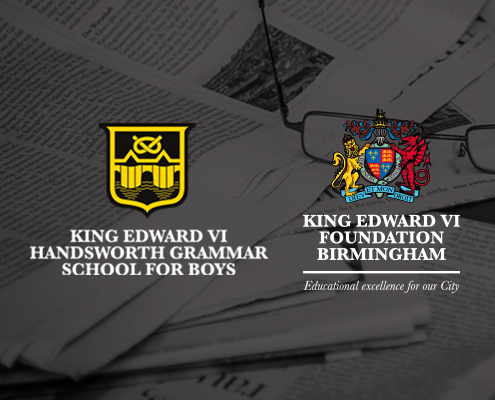No Place Like Brum
Some of our students, alongside Mr Conway, made an appearance in Lady Leshurr’s No Place Like Brum video for the Commonwealth Games. The full video can be seen in the following article on the BBC News website:
Commonwealth Games: Birmingham set for Thursday’s opening ceremony – BBC Sport
Inaugural House Public Speaking Competition (Year 8)
“Be still when you have nothing to say; when genuine passion moves you, say what you’ve got to say, and say it hot.”
-D.H. Lawrence
Everything we do in the English Department is underpinned by our vision statement where we work together to ensure our students are allowed to become the ‘cultured, engaged and informed’ citizens who are a force for good in modern Britain. The role public speaking has in fostering the aforementioned is not to be underestimated.
On what was a politically tumultuous day, our inaugural House Public Speaking Competition was held on Thursday 7th July 2022 showcasing the very best Year 8 public speakers HGS has to offer.
The journey to the final event began in March when curriculum time was given over to the teaching of the art of rhetoric. Students learnt the theory that underpins the craft of public speaking and thus curate knowledge to plan, deliver and perform a public speech on a topic of their choice inspired by the units studied in year 8. Following this, one student from each house was selected to present to Year 8 students and invited guests.
The judges for the final, Mrs. Begum, Mr. Dubay and Mrs. Hussain listened to five speeches altogether on subjects as varied as space exploration, the life and impact of William Blake upon protest movements and whether humanity can overcome the obstacles it faces.
The quality of the speeches was truly exceptional and made the process of judging an unenviable task.
However, there was one clear winner and so the judges awarded the prize to David Akanihu (8N) for his interesting, informative and well-argued speech about the importance of space exploration. What elevated his speech above the others was his conviction and his ability to subtly employ persuasive methods and ideas effectively throughout his sophisticated argument.
Matching or exceeding the quality of this year’s final will be no easy feat and our current year 7s will have big shoes to fill. However, we believe that they’re up for any challenge and so we look forward to hearing what 2023’s participants have in store for us!
Ex-HGS Pupil Appointed as Metropolitan Police Commissioner
Congratulations to Ex-HGS Pupil, Sir Mark Rowley, on his appointment as Commissioner of the Metropolitan Police. Please click here for more information.
Liz Kessler: Award-Winning Author (A Virtual Visit to HGS)
Liz Kessler, the multiple award-winning author of ‘When the World Was Ours’, visited HGS – albeit virtually – to share her experiences of writing what is a very touching novel inspired by the circumstances her family faced as a result of the Holocaust.
During the visit, we learnt many things about the war and I was personally intrigued by how the main storyline, characters and settings were crafted.
In the discussion, we learnt about the journey that Liz Kessler took across Europe to research information for her book. She shared personal letters and documents that defined her family’s past including a passport with a sign indicating Jewish identity. The world has since changed from the taxing war and concentration camps and other sites are still around such as sites in Auschwitz. We also were told about the tour guide whilst exploring a region in Europe and how he expressed some form of distaste against Jews thus showing us that Antisemitism still exists in pockets. Antisemitism is marginalising Jewish people from other people or a form of racism against Jews. As Liz Kessler was explaining the meaning of this you start to see the importance of modern-day racism, which is still a huge problem, and how we should respect one another for who we are.
Furthermore, we discovered that Liz Kessler’s great grandmother, Elsa, was a victim of the war and that the character Greta is a symbol of those who speak out against the subjugation of marginalised groups. We learned that Leo represents the Jews who escaped Nazi-controlled areas and that Elsa represents the other outcome. Max represents those who work or have joined with the Nazi rule through force or pressure. He is the inner part of humanity that compels us to question wrongful things.
Nearing the end of the interview, Liz Kessler detailed the writing process – from research to final production. We were told that it took serious determination and thorough research to produce ‘When the World Was Ours’. Kessler herself said that writing the book itself was one of the hardest things to do as throughout its creation she had to come to terms with the hard-hitting history behind Nazi rule and how almost 80 years on, regimes continue to ostracise minority groups. This, for her – and us – was an incredibly moving and emotional part of her discussion and we will never forget the impact that this visit had on us.
Thanks to this, we not only have a fantastic story to read but an understanding of how looking back to the past allows us to make sense of today.
‘When the World Was Ours’ shows us that the light of human kindness can shine even in the darkest of times.
Kirushikan Sunthereswaran
Warwickshire Cup Champions!
Our congratulations to the Under 13 Cricket Team and their Coach Mr Gallagher on becoming the Warwickshire Cup Champions!
They beat a local independent school in the final last night by 23 runs. HGS is now the proud custodian of the Warwickshire Schools Leslie Fellows Trophy. This is a huge achievement. Well done!
Big Bang Fair 2022
The Big Bang Fair was extremely fun and interesting – we had the opportunity to learn about different scientific industries and to participate in different activities. We also were able to collect many freebies, and my favourite one was the cube puzzle that we were challenged to make in less than two minutes.
We listened to a talk about inspiring careers, with the most interesting career being in Formula E. As well as this trip being fun, it taught us things that we did not know before. For example, I learnt about why people saw different colours on a picture.
The people at the fair were friendly, and answered all of our questions. There were many scientists and engineers who created prototypes for their projects and explained it to us. I also enjoyed the challenges- for example we had to find a scientist or an engineer and ask them a question to earn a sticker. If you collected three of them, you would have a chance to win a prize.
Overall, I enjoyed this trip massively!
Reeyan Iqbal (7W)


useful links
site info
T: 0121 554 2794
King Edward VI
Handsworth Grammar School for Boys,
Grove Lane, Birmingham,
West Midlands, B21 9ET


















